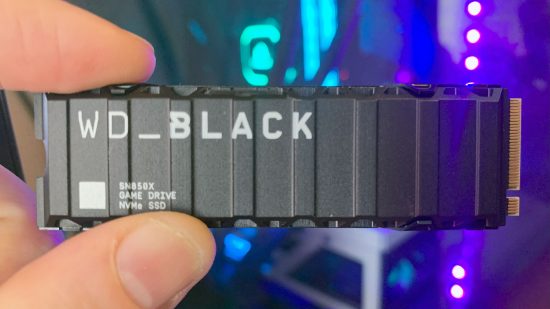Our Verdict
The WD Black SN850X is a fantastic SSD. It's not only very fast but, more importantly, it's also much cheaper than the competition, especially when compared to the Samsung 990 Pro. However, it gets hot, and you won't always see the benefits of its fast speed.
- Excellent speeds
- Competitive price
- 4TB model available
- Sequential speeds aren’t chart-topping
- Cheaper SSDs won’t feel much slower
- Hot peak temperatures with stock heatsink
If you thought PCIe 4.0 SSDs had already had their last gasp you’d be mistaken, as these drives still offer amazing performance. They’re also well-priced now and don’t require the massive cooling arrays of the latest PCIe 5.0 SSDs either. The WD Black SN850X is a prime example, pushing the PCIe 4.0 interface close to its limit, but for a very reasonable price.
There are several reasons why this Western Digital drive is currently our favorite on our best SSD for gaming guide, including its great performance, high capacity options, and competitive price. You can often pick up the 4TB version of this SSD for under $300 now, with the 2TB version we’re reviewing here usually going for around the $155 mark.
Why you can trust our advice ✔ At PCGamesN, our experts spend hours testing hardware and reviewing games and VPNs. We share honest, unbiased opinions to help you buy the best. Find out how we test.
Specs
These are the WD Black SN850X specifications:
| Interface | 4x PCIe 4.0 |
| Protocol | NVMe |
| Form factor | M.2 2280 |
| Capacities | 1TB, 2TB, 4TB |
| Formatted capacity | 1.81TB (2TB version) |
| Controller | WD 20-82-20035-B1 |
| Max read speed | 7,300MB/s (2TB version) |
| Max write speed | 6,600MB/s (2TB version) |
| Endurance rating | 1,200TBW (2TB version) |
| Warranty | Five years |
| NAND | TLC |
The WD Black SN850X uses the 4x PCIe 4.0 interface, and it pushes its limits hard when it comes to sequential read speeds. WD states that the 2TB version of this SSD can hit a read speed of 7,300MB/s, although its maximum claimed sequential write speed of 6,600MB/s lags behind the stated speeds of Samsung’s 990 Pro.
The limit of the interface means the SN850X can’t compete with the likes of new PCIe 5.0 SSDs, such as the Crucial T705, when it comes to raw performance, but it’s also massively cheaper, and it doesn’t run nearly as hot either.
That’s not to say the SN850X runs cool, though. Our review sample included a heatsink equipped with RGB lighting to keep it cool, and it does get hot under load. It even looks good, with the lighting controlled using WD’s Dashboard software, although there’s only a small section of lighting next to the printed logo on the heatsink.
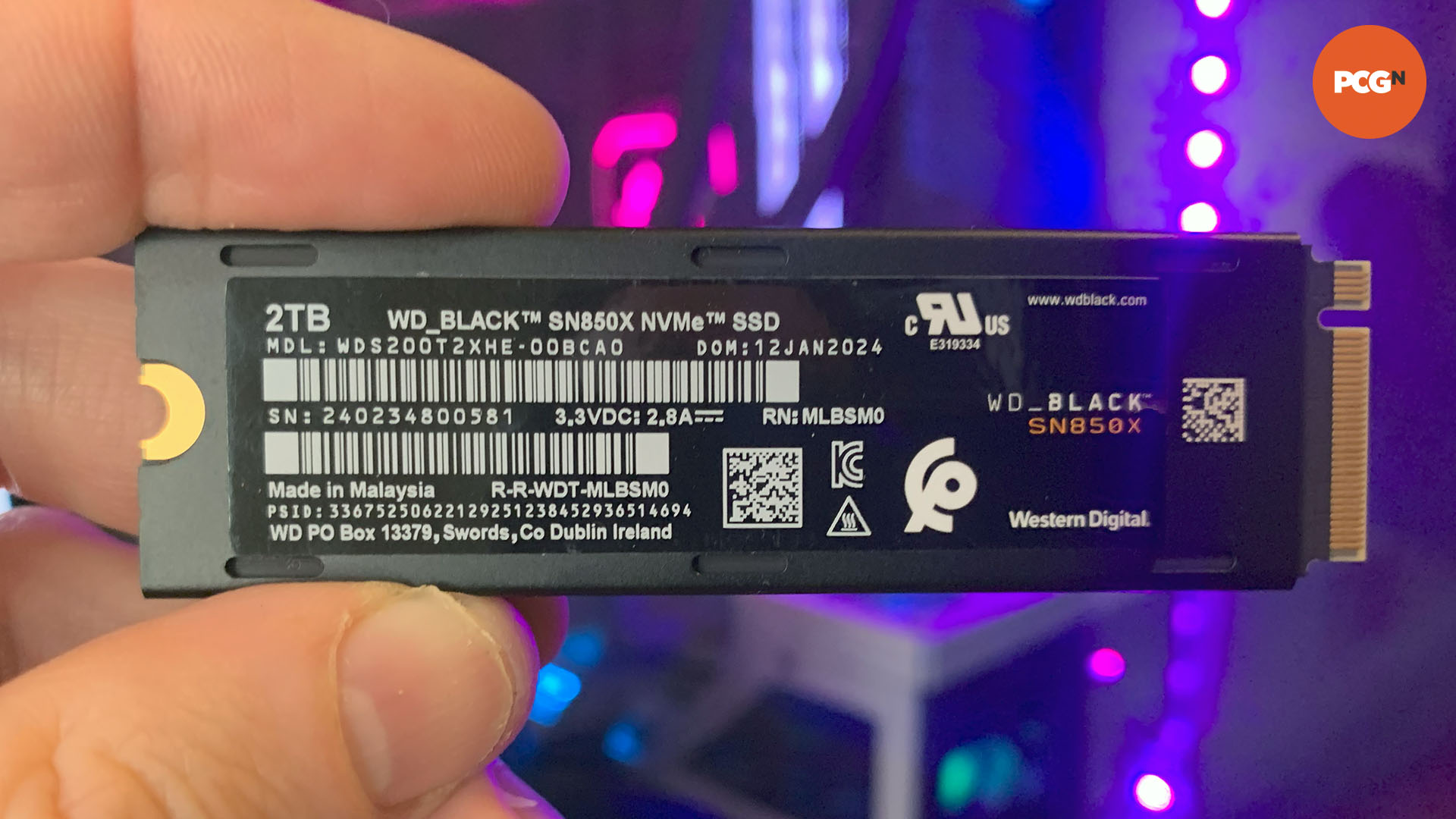
With the ability to dish out read speeds of up to 7,300MB/s, you’ll need that heatsink on the SN850X too, or at the very least you’ll need to use a heatsink that comes with your motherboard. Even with this chunky slab of illuminated metal attached to it, the SN850X still topped out at 69°C in our tests. That’s well short of throttling limits, but it’s still hot.
Unless you’re dead-set on having an RGB-enabled SSD, we recommend opting for the heatsink-less version, saving some money, and using a larger motherboard heatsink. However, bear in mind that this temperature was recorded as a worst-case scenario in our extended stress test.
The SN850X is also equipped with WD’s own 20-82-20035-B1 controller and triple-level cell (TLC) NAND flash memory. It also comes with a solid five-year warranty, and the endurance ratings are excellent, with a rating of 1,200 terabytes written (TBW) for our 2TB sample, although this is fairly standard now, with the Samsung 990 Pro offering the same endurance rating.
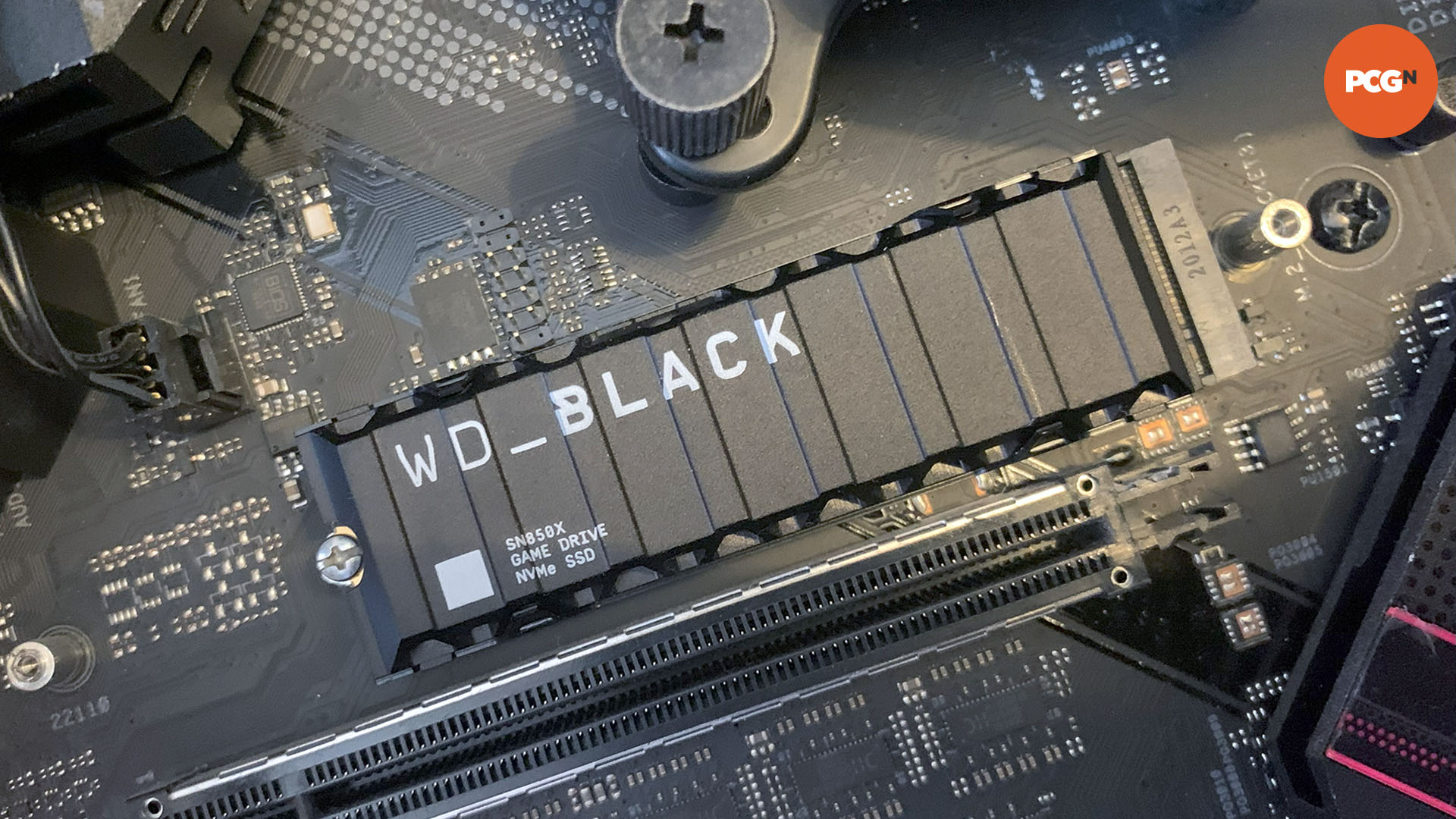
Performance
In terms of performance, the SN850X’s 4K single-thread, single-queue-depth random read and write speeds of 83MB/s and 221MB/s respectively in CrystalDiskMark are excellent, offering small advantages over the Samsung 990 Pro.
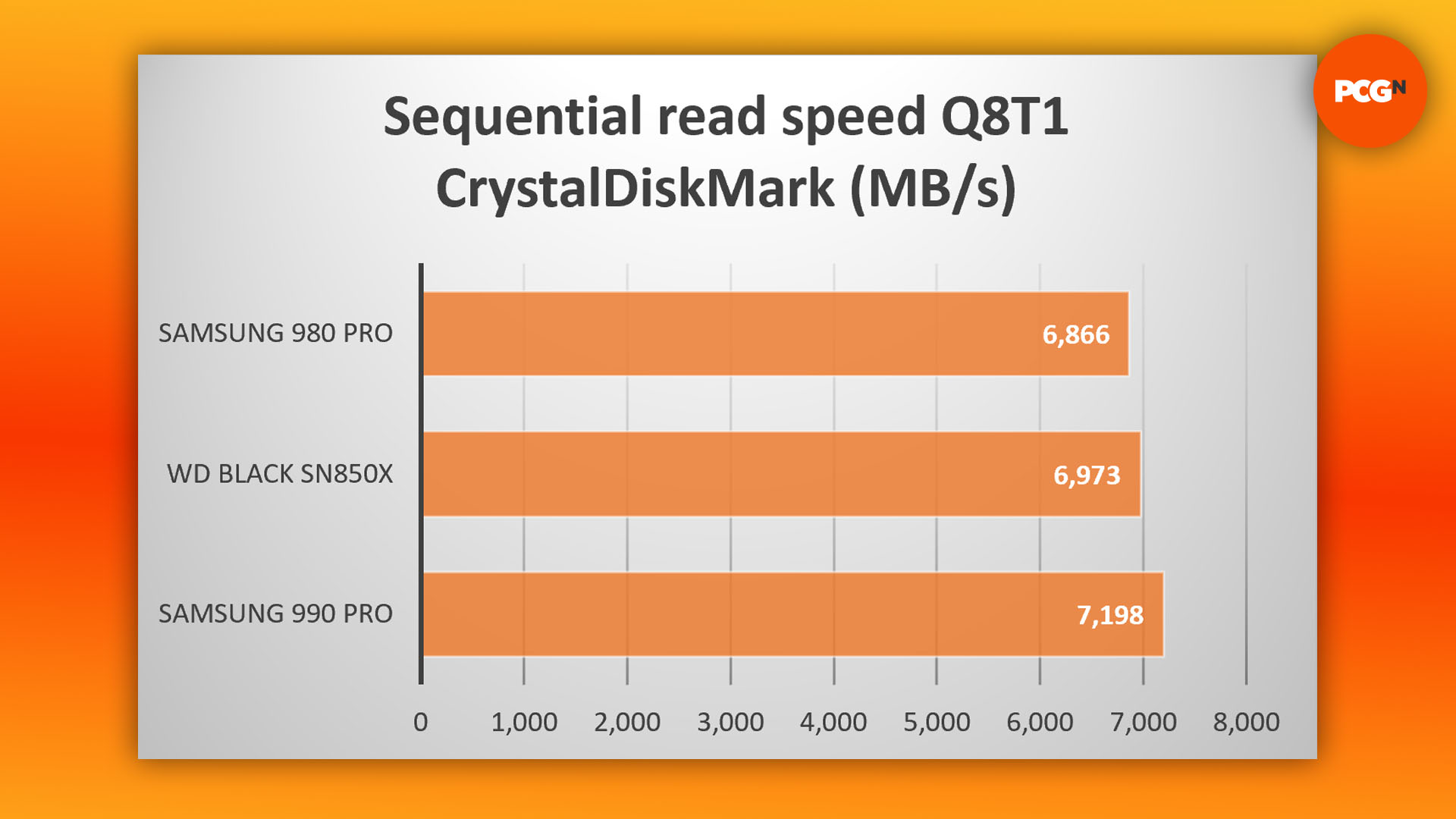
The latter managed higher sequential speeds, though, with the SN850X only hitting a read speed of 6,973MB/s, with the Samsung 990 Pro going well over the 7,000MB/s barrier with a 7,198MB/s result. Similarly, the 2TB WD Black SN 850X couldn’t hit its claimed 6,600MB/s write speed in our tests either, with a result of 6,379MB/s. Comparatively, the Samsung drive was quicker at 6,754MB/s.
That said, the WD Black SN850X still offers a good balance of performance here. Its read speed is still great, and its write speed is well above of previous drives, such as the Samsung 980 Pro, as you can see in the graph below.
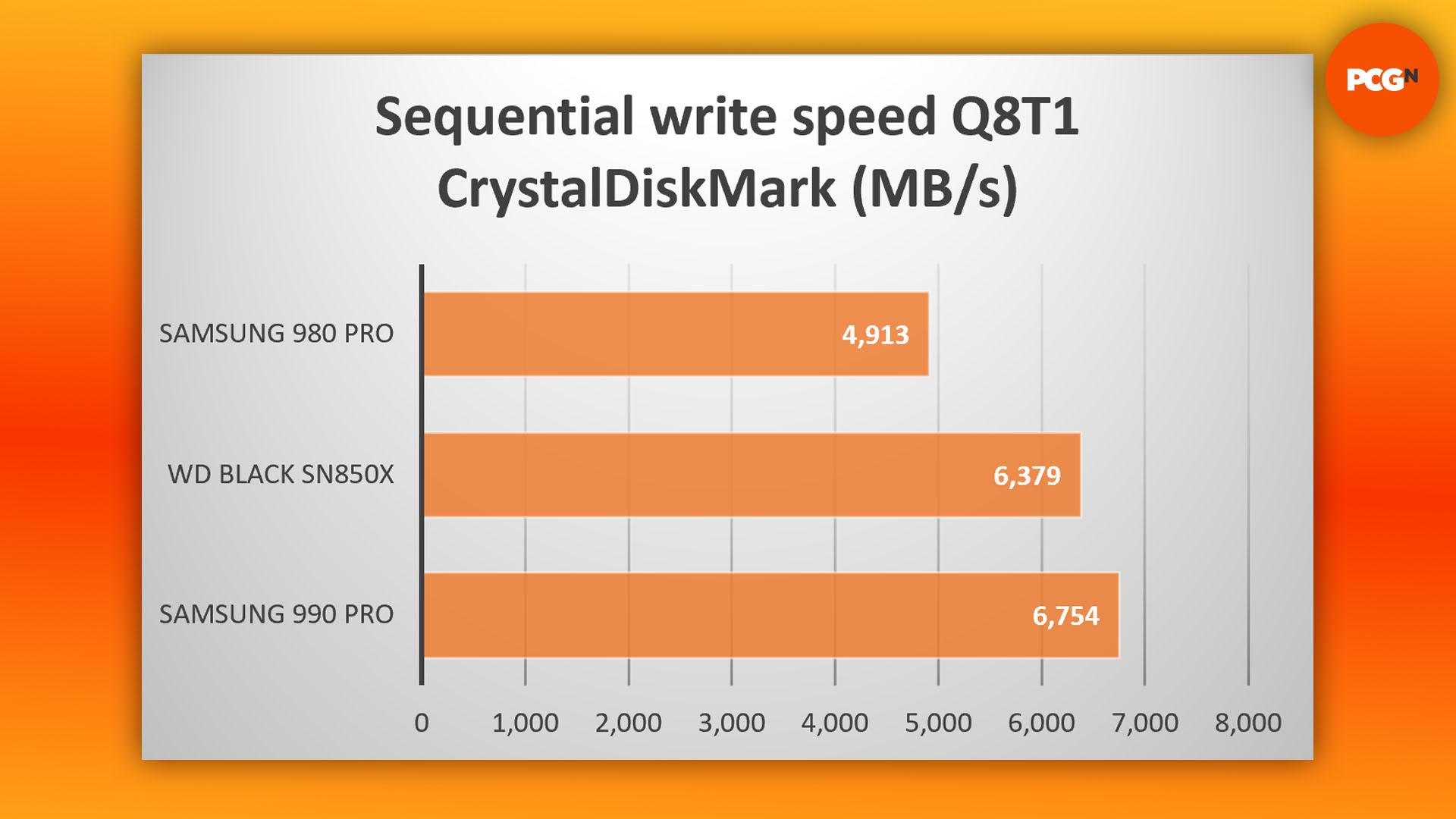
The SN850X also has another trick up its sleeve, though, with a Game Mode in its software that can prioritize the loading of game files in order to cut load times. We tested this in the 3DMark game load time and access time tests, and the SN850X was noticeably quicker than the Samsung SSD here.
For example, the WD drive has a load speed of 965MB/s in Call of Duty: Black Ops 4, compared to 739MB/s for the Samsung drive, and the SN850X’s latency of 70μs was tighter than the Samsung’s 87μs.
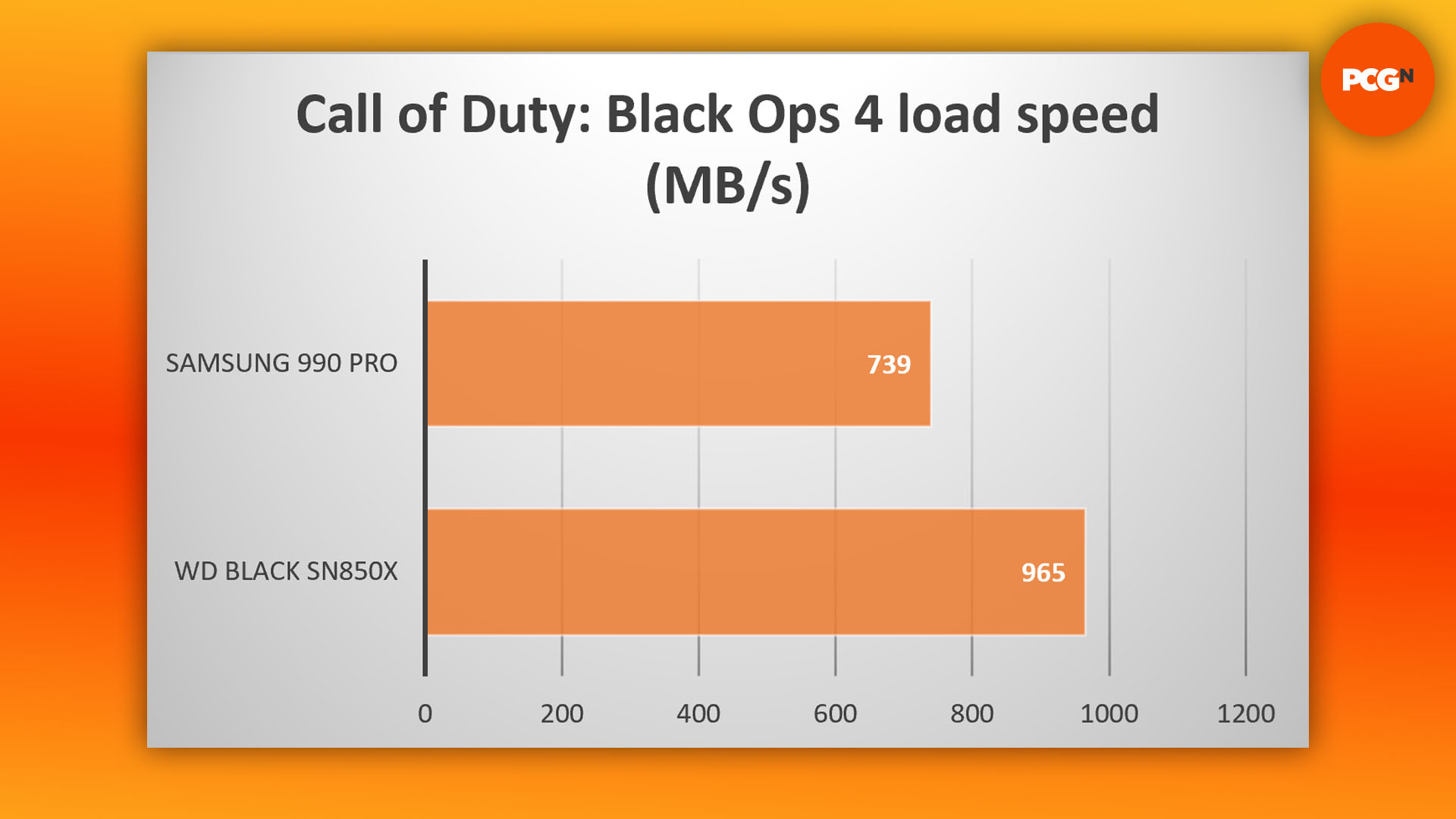
In Battlefield V, the SN850X also peaked at 1,154MB/s compared to 1,025MB/s for the Samsung 990 Pro, and again the Black SN850X managed a lower latency of 62μs versus 71μs. Both these drives are fast, but the WD Black SN850X is the better drive for gaming, and it has the benefit of cheaper pricing over the Samsung 990 Pro as well.
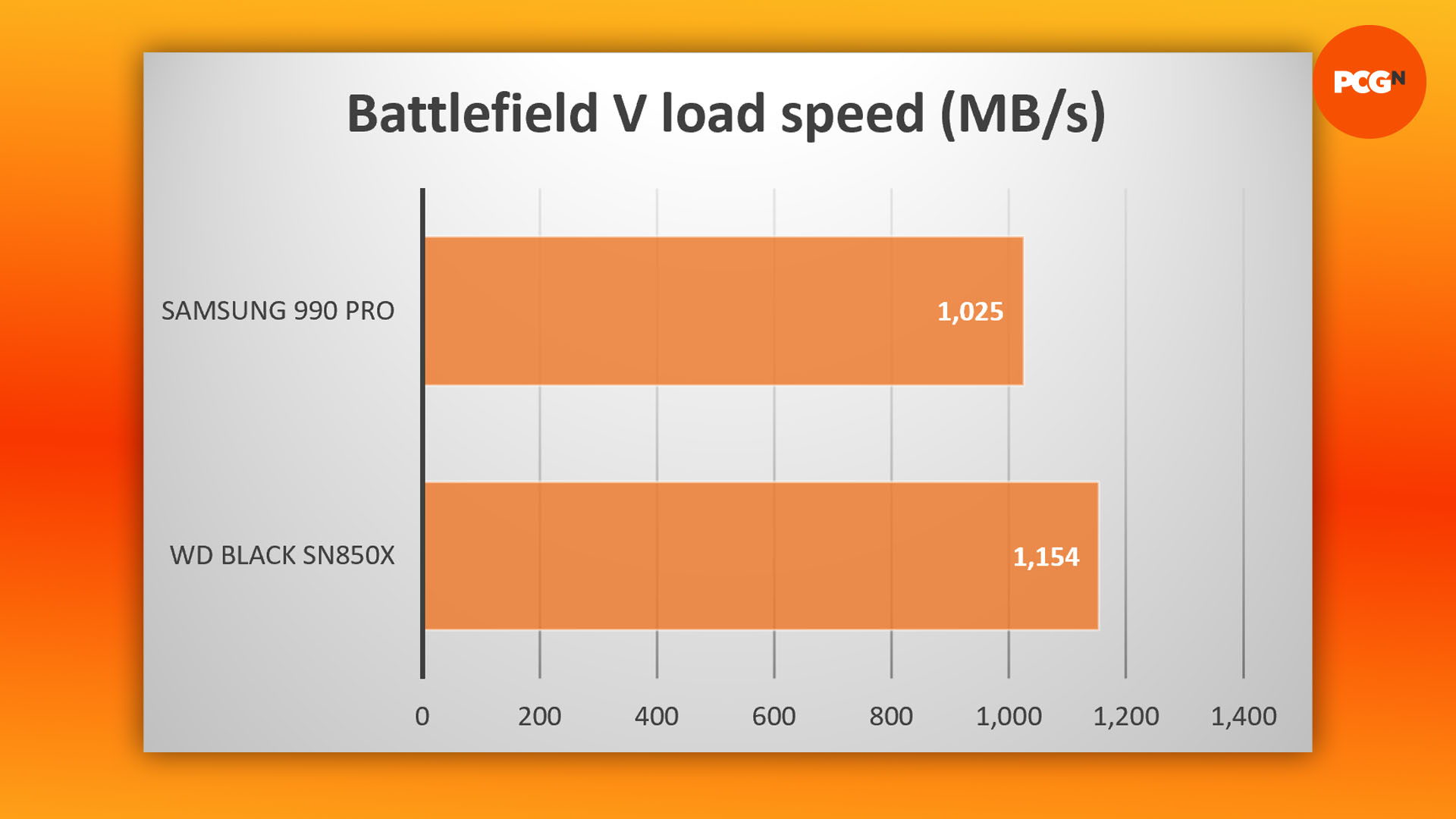
Price
The WD Black SN850X price is its main selling point at the moment, and it’s very competitive. You can usually buy the 2TB version of the drive for just $155, and it only costs a bit more to add a heatsink, while the 1TB drive is now available for around $85. Comparatively, a 1TB Samsung 990 Pro usually goes for around $129 right now, and it’s only slightly quicker.
If you have a PCIe 4.0 motherboard, the WD Black SN850X is a great upgrade, providing fast performance for not much money. Even if you have a PCIe 5.0 motherboard, the WD Black SN850X is still well worth considering, simply because it’s so much cheaper than PCIe 5.0 drives, and it’s still plenty fast enough.
Verdict
The WD Black SN850X might not have the absolute fastest sequential read and write speeds available, but the technology under the hood, as well as its quick game load times, really give it the edge over Samsung’s 990 Pro in game-focused tests.
We suggest saving yourself a few bucks and using your motherboard’s M.2 heatsinks instead of paying extra for the WD one, but even with the heatsink fitted, the current pricing for the SN850X range is superb for the performance on offer.
Alternatives
Samsung 990 Pro
Samsung’s flagship PCIe 4.0 SSD has come down a fair bit in price since it first launched and represents the pinnacle of SSD performance with the interface. It’s still more expensive than the WD Black SN850X, and it lacks the Game Mode to improve game load times, but if you move a lot of files around regularly, this speedy drive is a great choice if you don’t have a PCIe 5.0 motherboard.
Corsair MP700 Pro
The prices of the latest super-fast PCIe 5.0 SSDs are gradually coming down to more reasonable levels, and we liked this speedy drive in our Corsair MP700 Pro review. It’s not as quick as the Crucial T705, but it’s cheaper, cooler-running, and it also comes with the option of an air-cooled heatsink, which we highly recommend. This extra speed doesn’t make much difference to gaming right now, but if you want an all-round fast drive, the Corsair MP700 Pro is nearly twice as fast as the WD Black SN850X when it comes to sequential reads and writes.
